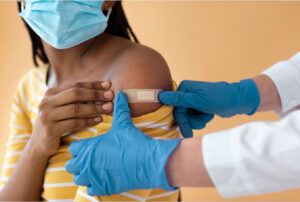
## Revolutionizing HIV Prevention: Groundbreaking Twice-Yearly Injection Reveals Unmatched Success
A pioneering clinical trial spearheaded by researchers from Emory University has unveiled fresh avenues for HIV prevention, showcasing that a biannual injection of Lenacapavir provides 96% more protection than the existing daily oral regimen. Featured in the *New England Journal of Medicine*, this study marks a vital milestone in making HIV prevention more reachable, particularly for communities that are disproportionately impacted by the virus.
### Breakthrough Results from an International Clinical Trial
The Phase 3 clinical trial, backed by Gilead Sciences, assessed the effectiveness of Lenacapavir, a long-lasting injectable treatment, in comparison to the standard daily oral pre-exposure prophylaxis (PrEP) treatment, F/TDF (emtricitabine-tenofovir disoproxil fumarate). Conducted at 88 sites globally, the trial included 3,265 participants, prioritizing representation from the populations most affected by HIV. Participants were randomly assigned in a 2:1 ratio to receive either subcutaneous Lenacapavir injections every 26 weeks or daily oral PrEP.
The findings were remarkable: the Lenacapavir group reported just two new HIV infections, resulting in an infection rate of 0.10 per 100 person-years. This is a stark contrast to the nine new cases in the F/TDF group, equating to 0.93 per 100 person-years. For context, the background incidence rate of HIV in the screened population was 2.37 per 100 person-years. Lenacapavir’s effectiveness signifies a revolutionary advancement for the highest-risk populations, highlighting its potential to reshape HIV prevention standards.
Dr. Colleen Kelley, the lead author and a professor at Emory University’s School of Medicine, expressed enthusiasm regarding these results: “This study signifies a tremendous leap forward in medicine, particularly for individuals facing challenges with daily adherence to PrEP. The accessibility and outstanding effectiveness of biannual injections could significantly enhance HIV prevention initiatives.”
### Tackling the Challenge of Medication Adherence
Daily adherence to oral PrEP has long posed a significant barrier in HIV prevention efforts. Studies indicate that nearly 50% of individuals on daily oral PrEP cease usage within the first year due to logistical issues, stigma, or barriers in healthcare access. Lenacapavir removes the requirement for daily commitments, necessitating only biannual subcutaneous injections.
This biannual injection could help close essential gaps by making HIV prevention less demanding for populations that find it difficult to adhere to daily routines. As Dr. Kelley remarks, “Simplifying dosing regimens is not merely a convenience; it broadens access and enhances outcomes for underserved communities.”
### A Dedication to Diversity and Inclusion
Acknowledging the disproportionate influence of HIV on marginalized populations, the study actively sought to include participants from diverse global backgrounds, encompassing countries like South Africa, Peru, Thailand, Brazil, and the United States. Resources and services were provided in various languages, and bilingual staff assisted in recruitment and care at trial sites.
Dr. Valeria Cantos, principal investigator at the Grady research site and associate professor at Emory University’s School of Medicine, emphasized the significance of this dedication: “Study designs that prioritize inclusivity not only ensure scientific integrity but also practical applicability in the real world. Engaging communities with limited access to PrEP is vital for alleviating global inequalities in HIV prevention.”
### Safety and Accessibility
A significant element of the trial assessed the safety profile of Lenacapavir, which yielded promising results. While some participants experienced mild reactions at the injection sites leading to discontinuation in 1.2% of cases, no substantial safety issues arose. In comparison, just 0.3% of participants in the F/TDF group discontinued due to adverse reactions.
Nevertheless, as Dr. Carlos del Rio, Chair of the Department of Medicine at Emory University, points out, Lenacapavir’s success hinges on equitable access for patients. “This breakthrough provides hope, but the real test of its impact will depend on ensuring that cost, healthcare infrastructure, and stigma do not create additional obstacles,” Dr. del Rio articulated.
### Consequences for Vulnerable Communities
The public health ramifications of Lenacapavir are significant, especially when considering populations disproportionately impacted by HIV. In the United States, over half of new HIV diagnoses involve cisgender gay men, with 70% of these infections occurring among Black or Hispanic individuals. Lenacapavir alleviates both behavioral and systemic obstacles, including fewer healthcare visits (reduced from quarterly to biannual), potentially creating a more equitable landscape for underserved communities.
### What Lies Ahead?
With the successful conclusion of this trial, the FDA is currently reviewing Lenacapavir for formal approval, which could manifest as early as 2025. If sanctioned, it would signify a dramatic shift in the methodology of HIV prevention, offering a more straightforward solution that could significantly reduce new infections worldwide.
The insights gained from this study illuminate